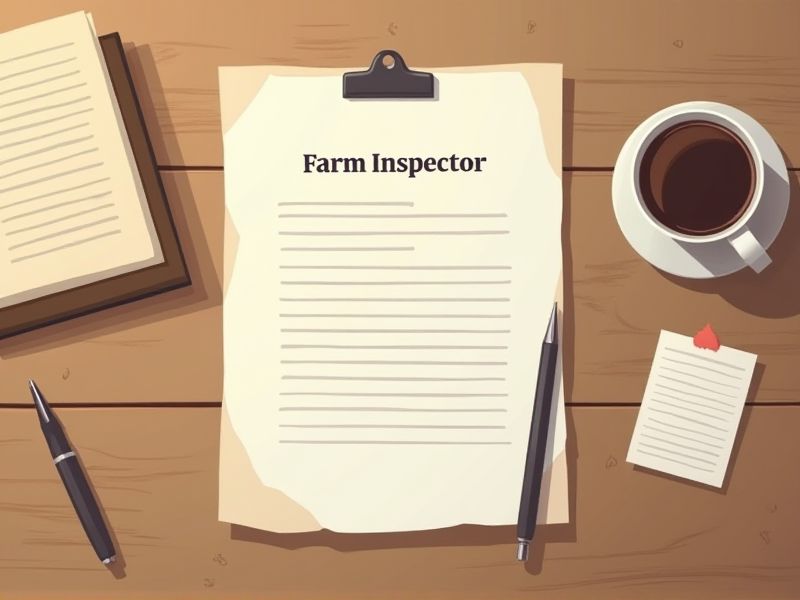
A Farm Inspector plays a crucial role in ensuring agricultural operations meet health, safety, and environmental standards. Certifications are necessary for this position to verify proficiency in areas such as pest management, soil conservation, and agricultural law compliance. Without these certifications, inspectors may lack the validated skills needed to identify issues and enforce regulations effectively. Here are a few essential certifications necessary for a Farm Inspector.
Certified Crop Adviser (CCA)
Certified Crop Advisers possess a deep understanding of agronomy, enabling them to assess crop health and management practices effectively. Their expertise in soil science and pest management aids farm inspectors in identifying areas for improvement. CCA certification ensures they are up-to-date with the latest agricultural regulations and technologies, supporting compliance checks. The CCAs' insights into sustainable practices help farm inspectors promote environmentally-friendly farming.
Certified Pesticide Applicator
Farm inspectors require Certified Pesticide Applicators because they possess crucial knowledge regarding safe pesticide use, which ensures compliance with agricultural safety standards. This certification helps inspectors identify potential risks associated with improper pesticide application, thus safeguarding environmental health. Certified applicators can guide farmers in adhering to regulations, minimizing legal liabilities. Their expertise also enhances crop quality by promoting effective pest management practices.
USDA Organic Certification Inspector Training
USDA Organic Certification Inspector Training is necessary to ensure farm inspectors fully understand the stringent guidelines and standards for organic farming. Thorough training equips inspectors with the knowledge to accurately assess compliance, which helps maintain the integrity of the USDA organic label. The training enables inspectors to identify potential violations or discrepancies, safeguarding consumer trust in organic products. Proper certification training also keeps inspectors updated on evolving regulations and industry best practices.
Food Safety HACCP Certification
Farm inspectors need Food Safety HACCP Certification because it equips them with the expertise to identify and evaluate critical control points that could lead to food safety hazards. This certification ensures inspectors can effectively implement preventive measures, reducing the risk of contamination in the food supply chain. With proper training in HACCP principles, inspectors can enhance the compliance of farms with safety regulations, promoting consumer confidence. By maintaining this certification, farm inspectors help minimize foodborne illnesses and support public health initiatives.
Global Food Safety Initiative (GFSI) Certification
GFSI Certification enhances the credibility of farm inspectors by aligning their work with internationally recognized safety standards. Buyers and retailers often demand this certification to ensure consistent quality and safety across the supply chain. Farms adopting GFSI standards reduce the risk of food safety incidents, which can protect consumer health and prevent economic losses. Trained inspectors in GFSI guidelines are crucial for maintaining compliance and avoiding costly recalls.
Good Agricultural Practices (GAP) Certification
Good Agricultural Practices (GAP) Certification ensures that farm inspectors can effectively evaluate food safety, environmental impact, and worker welfare standards. Farm inspectors with GAP certification are better equipped to identify potential risks and enforce compliance, leading to safer food supply chains. GAP certification supports agricultural sustainability, which aligns with global efforts to reduce environmental footprints and promote biodiversity. Implementing GAP standards on farms often results in improved product quality, fostering consumer trust and expanding market access.
Certified Agricultural Inspector (CAI)
Certified Agricultural Inspectors (CAIs) possess specialized knowledge in agricultural practices, which ensures farms meet regulatory standards and safe production methods. Their expertise in evaluating soil, crop health, and pest management contributes to sustainable farming and enhanced productivity. The presence of CAIs facilitates compliance with government policies, reducing the risk of fines or legal issues for farm operators. Regular inspections by CAIs help maintain food safety, safeguarding public health by ensuring produce and livestock are free from harmful contaminants.
Occupational Safety and Health Administration (OSHA) Certification
A farm inspector with OSHA certification ensures compliance with established safety standards, reducing workplace accidents and diseases. Certified inspectors possess knowledge of hazard identification, helping to mitigate potential risks on farms. This certification enhances the credibility of inspections, reassuring farm owners and workers about safety practices. Lack of certified oversight could lead to increased accidents and liabilities, impacting farm productivity and worker wellbeing.
Environmental Compliance Certification
Environmental Compliance Certification equips farm inspectors with the knowledge to assess farms against environmental laws and regulations. It ensures inspections are conducted consistently, reducing legal risks for both inspectors and farm operators. Certification assures that inspectors can identify potential environmental hazards, thereby promoting sustainable farming practices. It also enhances public trust in agricultural products by confirming adherence to environmental standards.
Certified Food Safety Auditor
A Certified Food Safety Auditor ensures that farms adhere to established food safety regulations, which helps in minimizing risks of contamination. Their expertise allows for the identification of potential safety hazards on the farm, thus protecting consumer health. They provide a structured assessment, resulting in a more reliable and standardized inspection process. Having such an auditor strengthens public trust in the agricultural supply chain by ensuring consistent compliance with safety standards.
Summary
You can expect increased confidence in compliance and quality assessments when engaging a certified Farm Inspector. Certifications enhance skills, leading to more accurate and reliable evaluations. The presence of certified inspectors can improve farm operations and adherence to regulatory standards. Certified inspectors contribute to overall agricultural sustainability and food safety.
